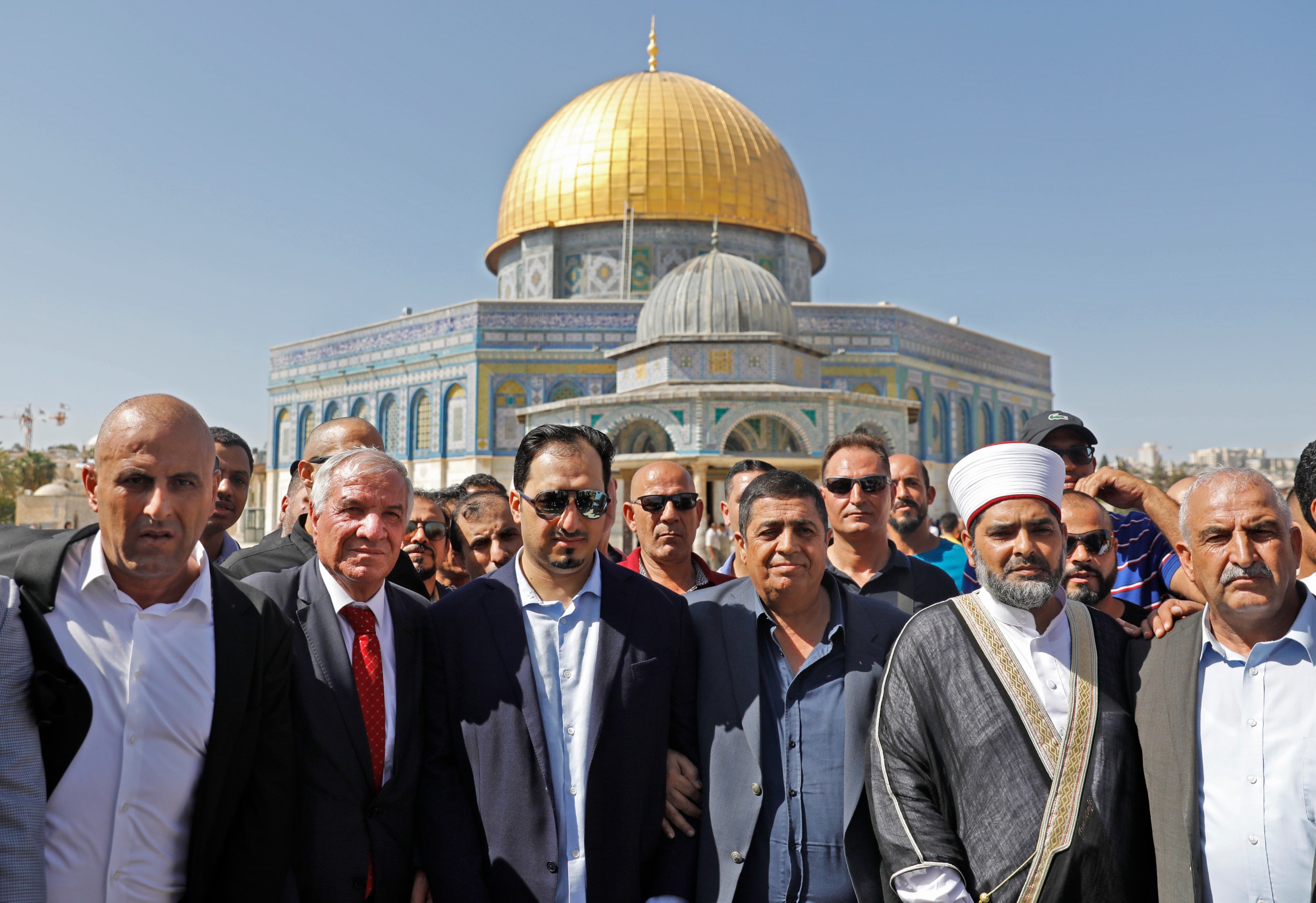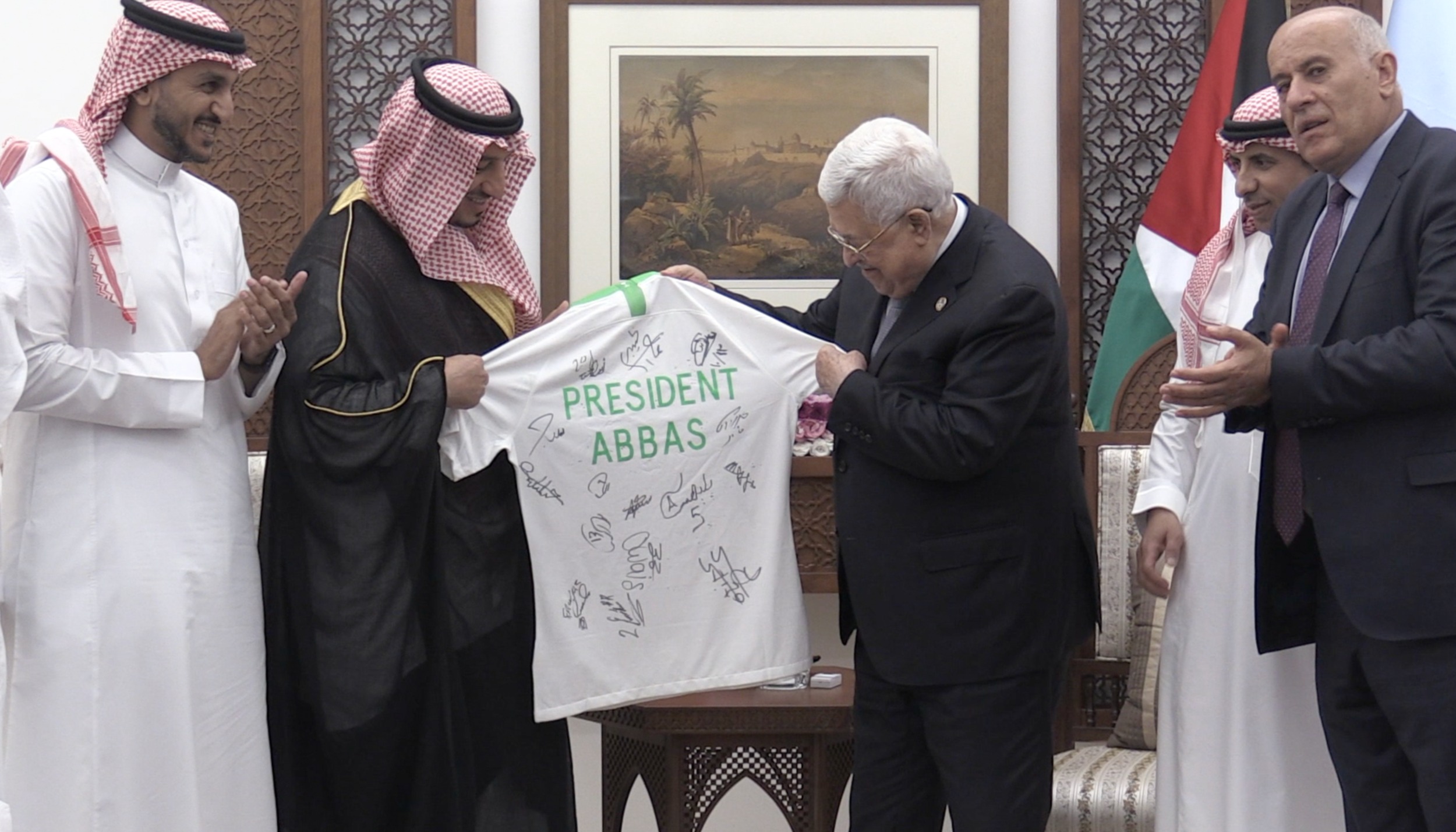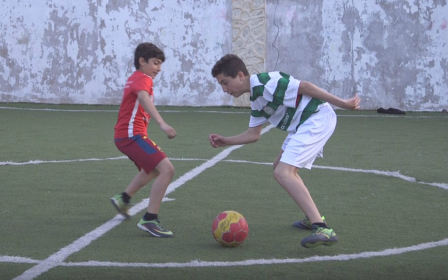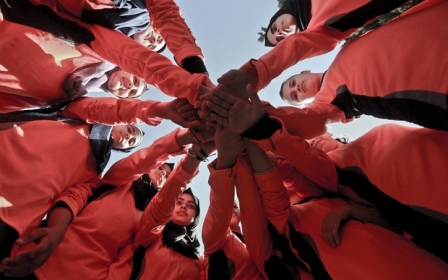Saudi football team's first Palestinian visit met with anger at Al-Aqsa
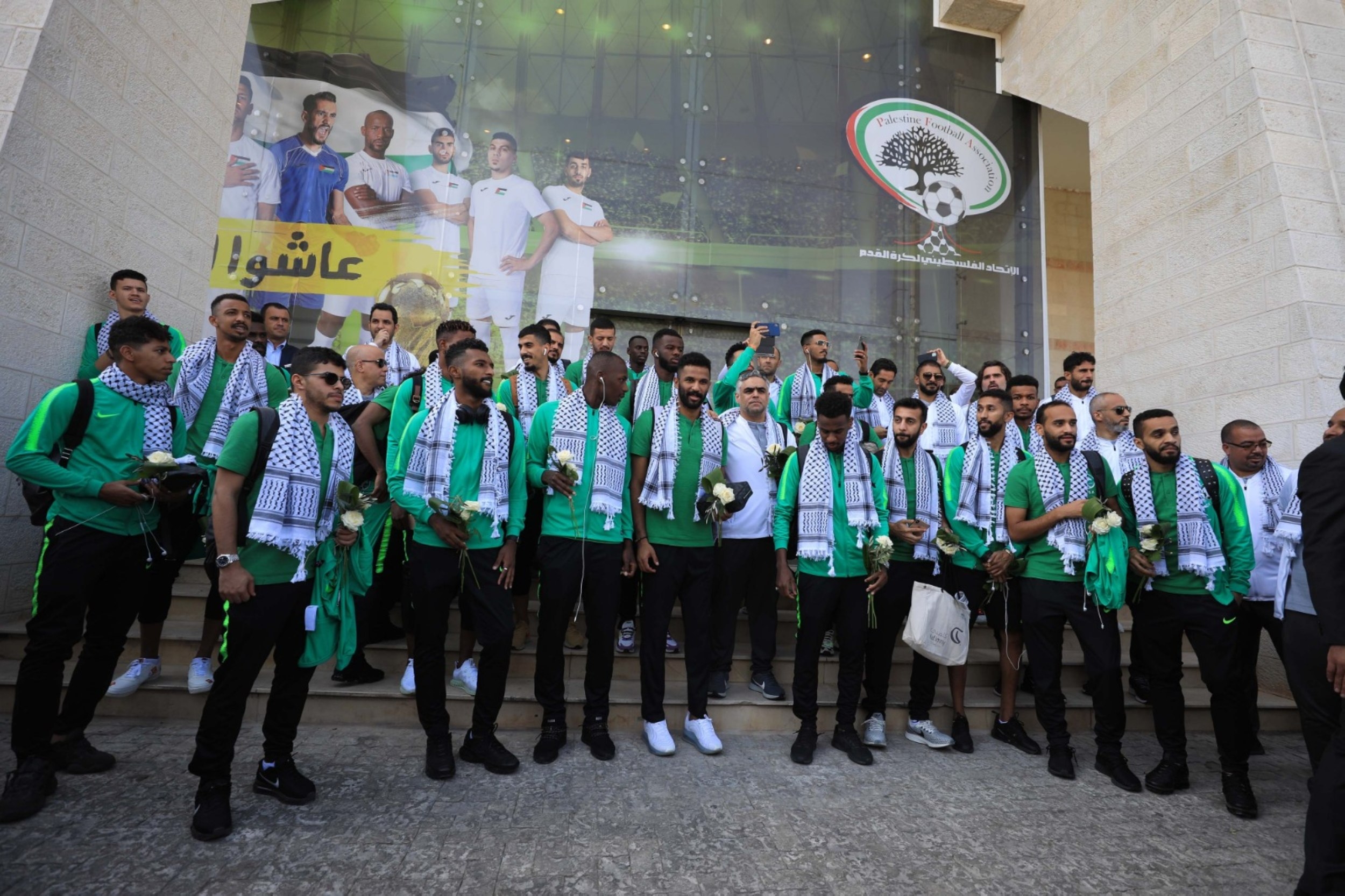
A Saudi delegation that visited the Al-Aqsa Mosque in occupied East Jerusalem for the first time has provoked anger among Palestinians just a day after arriving in the West Bank.
The Palestinian football team play Saudi Arabia on Tuesday in the occupied West Bank city of Ramallah, in a qualifying match for both the 2022 World Cup and the 2023 Asia Cup. The game marks the first time an official Saudi delegation enters the occupied Palestinian territories.
The delegation that visited Al-Aqsa on Monday consisted of 13 Saudi team managers, escorted by Palestinian officials and plainclothes security personnel.
Palestinian worshippers at the site - one of the holiest in Islam - protested against the visit. The delegation’s guards kept worshippers away and prevented them from talking with the Saudis.
Israeli forces that control entry into Al-Aqsa arrested three Palestinians during the visit, according to local media.
Huge delegation
The 100-person Saudi delegation arrived in Ramallah on Sunday after going through the Karama crossing, also known as the Allenby Bridge, the only border crossing between Jordan and the occupied West Bank.
Saudi Arabia is a longtime financial backer of the cash-strapped PA, and Palestinian President Mahmoud Abbas gave a major political reception for the Saudi guests.
However the Saudi delegation was reportedly subjected to strict inspection procedures before Israel, which controls the crossing with Jordan, allowed it to enter the West Bank.
In a welcoming speech, Abbas said: “We apologise for the delay and some obstacles, we the Palestinians suffer from every day. But it is worth it, it is important that you are in the land of Palestine and among your Palestinian brothers."
The visit comes as Saudi Arabia enjoys warming relations with Israel, while cooling on its support for the Palestinian cause.
The visit, only feasible with tacit Israeli support, is seen by Palestinians as the latest proof that the Gulf kingdom is abandoning what used to be an Arab consensus in favour of a boycott of Israel and pushing for a normalisation of ties with Israel.
The visit of the Saudi delegation to Al-Aqsa Mosque came during the Jewish Festival of Tabernacles, or Sukkot. Israeli forces routinely limit access to the Al-Aqsa Mosque compound to Palestinians during Jewish holidays, while allowing Jewish settlers in to pray in violation of an agreement between Israel and Jordan.
Unprecedented visit
All visa requests filed through the PA require final approval by Israeli authorities - meaning that, however indirectly, Israel gave its green light for the Saudis to enter the West Bank.
Jibril Rajoub, the head of the Palestinian Football Federation and a former head of the Palestinian Preventive Security forces, noted that the visit was unprecedented in the history of Palestinian football.
“Politically, it is a culmination of a steady effort, investment and policy by Saudi Arabia since the beginning of our cause and the start of our revolution,” Rajoub said.
But while Abbas called the arrival of the Saudi delegation “a pleasure for the Palestinian people”, many Palestinians believe the visit is purely political, marking a new chapter in the normalisation of relations between Israel and Arab countries.
In 2015, the Saudi Football Federation had refused to hold a match against the Palestinian national team in Jerusalem for the 2018 World Cup and 2019 Asian Cup qualifiers, in order to comply with the Arab League’s boycott of Israel.
In the four years since, Saudi Arabia has come out in support of US President Donald Trump’s controversial “deal of the century” plan for Israel and Palestine, despite it being strongly rejected by all Palestinian political organisations for its strong bias in favour of Israel and for failing to guarantee Palestinian sovereignty.
In a statement, the Palestinian Boycott, Divestment and Sanctions National Committee (BNC) said that the Saudi football delegation’s visit did not strictly violate the boycott, as the visas were requested through the PA.
However, the BNC added, the decision to travel to the occupied territories four years after refusing to do so was significant, within a context of growing normalisation of relations between Israel and a number of Arab Gulf countries.
Accusations of sportswashing
The Saudi football team’s ability to enter the West Bank was all the more jarring for many observers given that Palestinians themselves are impeded by Israel from moving freely between the occupied Palestinian territories.
Speaking to Middle East Eye, Palestinian sports journalist Ahmed Abu Diab pointed out that the West Bank-based Palestinian national team currently does not have any players from the Gaza Strip, compared to 11 Gazan players in 1999.
'Using sports is an easy gateway for normalisation'
- Mahmoud Hamdan, Palestinian activist
Israel’s blockade of Gaza since 2007 has played a large role in preventing Palestinian football players from traveling between the West Bank and the Gaza Strip. For Abu Diab, the fact that Israel granted passage of the Saudi team raised many questions about the political objectives of this visit.
Abu Diab noted that a Palestinian home stadium could be established in Gaza and receive Arab delegations there without forcing them to obtain Israeli permits - as Gaza has a border crossing with Egypt uncontrolled by Israel.
The Palestinian Popular Campaign Against Normalisation - a recent campaign led by a group of Palestinian youth - meanwhile began an online campaign on social media on Wednesday to reject the Saudi team's visit.
Mahmoud Hamdan, an activist in the campaign, told MEE that he saw the visit as indicative of tacit Saudi acceptance of the occupation, while attempting to polish its popular image in the Arab world amid its much-critiqued military involvement in Yemen since 2015.
Hamdan also noted that scores of Palestinians are currently detained by Saudi Arabia.
“Palestinian activists are well aware of the seriousness of the Saudi team's visit as a prelude to Arab normalisation with Israel,” he added. “Using sports is an easy gateway for normalisation, imposing it on sports fans who do not see the political connection.”
Middle East Eye propose une couverture et une analyse indépendantes et incomparables du Moyen-Orient, de l’Afrique du Nord et d’autres régions du monde. Pour en savoir plus sur la reprise de ce contenu et les frais qui s’appliquent, veuillez remplir ce formulaire [en anglais]. Pour en savoir plus sur MEE, cliquez ici [en anglais].


